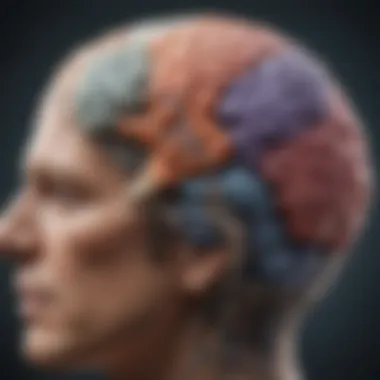Unraveling the Complex Relationship Between ADHD and Depression


Understanding the Complex Relationship Between ADHD and Depression
Attention-DeficitHyperactivity Disorder (ADHD) and depression are two mental health conditions that often intersect, creating a complex interplay that influences an individual's overall well-being. ADHD, characterized by difficulties in attention, hyperactivity, and impulsivity, can significantly impact mood regulation and cognitive functions, potentially leading to the development or exacerbation of depressive symptoms. Understanding the intricate relationship between these two conditions is crucial for effective management and treatment strategies. This article explores the nuanced connection between ADHD and depression, shedding light on how these disorders coexist and influence one another.
Unraveling the Impact of ADHD on Depressive Symptoms
Individuals diagnosed with ADHD may be at a higher risk of experiencing depressive symptoms, such as persistent sadness, feelings of worthlessness, and loss of interest in previously enjoyed activities. The challenges associated with managing ADHD, including difficulties in organizing tasks, time management, and coping with daily responsibilities, can contribute to heightened stress levels and a sense of overwhelm, increasing vulnerability to depression. By delving into how ADHD manifests in depressive symptoms and understanding the underlying mechanisms involved, we can better address the holistic well-being of individuals navigating both conditions concurrently.
Exploring the Underlying Connections between ADHD and Depression
The co-occurrence of ADHD and depression often stems from shared neurobiological factors, including disrupted neurotransmitter systems and altered brain circuitry. Research suggests that the prefrontal cortex, responsible for executive functions such as impulse control and decision-making, may exhibit differences in individuals with ADHD and comorbid depression. Additionally, emotional dysregulation, common in both disorders, further complicates the symptomatology and treatment approaches. Unpacking the intricate web of connections between ADHD and depression offers valuable insights into targeted interventions and therapeutic strategies.
Strategies for Managing Coexisting ADHD and Depression
Effective management of ADHD and depression involves a multifaceted approach that addresses symptomatology, functional impairments, and overall quality of life. Combining pharmacological interventions, such as stimulant medications for ADHD and antidepressants for depression, with psychotherapy modalities can optimize treatment outcomes. Additionally, psychoeducation, cognitive-behavioral strategies, and lifestyle modifications, including regular exercise, adequate sleep, and stress-reduction techniques, play pivotal roles in fostering resilience and mitigating the impact of both conditions. By prioritizing integrated care and personalized treatment plans, individuals can navigate the complexities of coexisting ADHD and depression with greater ease and empowerment.
Understanding ADHD and Depression
In this segment of the article, we will delve deep into the intricate connection between Attention-DeficitHyperactivity Disorder (ADHD) and depression. Understanding this relationship is crucial in shedding light on how ADHD can potentially impact and exacerbate depressive symptoms. By exploring the underlying mechanisms that interlink these two conditions, we aim to equip readers with a nuanced understanding of the complexity involved in managing both ADHD and depression concurrently.
What is ADHD?
Attention-DeficitHyperactivity Disorder, commonly referred to as ADHD, is a neurodevelopmental disorder characterized by persistent patterns of inattention, impulsivity, and hyperactivity that may interfere with daily functioning. Individuals with ADHD often struggle with maintaining focus, following through on tasks, and regulating their impulses, leading to challenges in academic, work, and social settings. Understanding the manifestations and impact of ADHD is imperative in recognizing how this condition can influence and interact with depressive symptoms.
What is Depression?
Depression, a prevalent mental health condition, goes beyond temporary feelings of sadness and encompasses persistent and profound feelings of hopelessness, worthlessness, and disinterest in previously enjoyed activities. Individuals with depression may experience disturbances in sleep, appetite, and concentration, significantly impacting their overall quality of life. Exploring the nature of depression is vital in comprehending how this emotional state can be exacerbated by the presence of ADHD, paving the way for a more holistic approach to addressing both conditions simultaneously.
Prevalence and Coexistence


In this section on the prevalence and coexistence of ADHD and depression, it is crucial to delve into the statistical landscape and the intricate relationship between these mental health conditions. Understanding the prevalence sheds light on the significance of addressing their coexistence for targeted interventions and support. By exploring the frequency of co-occurrence in individuals diagnosed with ADHD, we can grasp the challenges faced by those struggling with both conditions simultaneously. This section aims to highlight the nuanced prevalence rates and the implications of coexisting ADHD and depression.
Stats on ADHD and Depression
Within the realm of ADHD and depression, statistical data plays a vital role in illustrating the scope and impact of these interconnected disorders. These statistics encompass prevalence rates, demographic trends, and variations in symptom severity among individuals with ADHD and comorbid depression. By examining statistical insights, we gain comprehensive knowledge of the prevalence of depression in the ADHD population, aiding in the identification of at-risk groups and enhancing targeted treatment strategies.
Overlap and Comorbidity
The overlap and comorbidity between ADHD and depression represent a complex intertwining of symptoms and challenges that individuals may face. Exploring the intricate relationship between these conditions allows us to understand the shared symptomatology, potential causal factors, and implications for diagnosis and treatment. By unraveling the nuances of comorbidity, we can effectively address the unique needs of individuals coping with both ADHD and depression. This section aims to elucidate the implications of concurrent ADHD and depression, offering insights into tailored interventions and holistic approaches for improved mental well-being.
Factors Contributing to Depression in ADHD
In this section, we delve into the factors contributing to depression in individuals with ADHD. Understanding these factors is crucial as it sheds light on the complex interplay between ADHD and depression. By examining both neurological and psychological aspects, we can gain valuable insights into the underlying mechanisms linking these two conditions and explore effective management strategies.
Neurological Factors
Dopamine Dysregulation
Brain Structure Variances
Understanding brain structure variances is paramount in unraveling the complexities of ADHD-related depression. This aspect delves into the structural differences in the brain of individuals with ADHD, highlighting variations in regions responsible for attention, emotion regulation, and reward processing. The key characteristic of brain structure variances lies in their impact on neurodevelopmental trajectories and behavioral outcomes. By exploring these variances, we can identify patterns associated with depression in ADHD and devise targeted interventions to support individuals struggling with coexisting conditions.
Psychological Factors
Low Self-Esteem
Low self-esteem emerges as a significant psychological factor contributing to depression in individuals with ADHD. This aspect focuses on the negative self-perceptions and feelings of inadequacy experienced by many individuals with ADHD, leading to a heightened risk of developing depressive symptoms. The key characteristic of low self-esteem lies in its influence on self-image and emotional well-being, making it a crucial element to address in therapeutic interventions. By recognizing and addressing low self-esteem, we can empower individuals to cultivate resilience and self-compassion, essential components in managing depression alongside ADHD.
Cognitive Distortions


Impact on Daily Functioning
Diving deeper, the repercussions of these intertwined conditions can significantly impede an individual's performance at work and school. Distinct challenges emerge, hindering focus, productivity, and overall efficiency in academic and professional settings. The core functions required for success in these spheres can be compromised, giving rise to a complex interplay of symptoms and struggles that demand attention and consideration.
Challenges in Work and School
The challenges that arise in work and school settings for individuals grappling with ADHD and depression are multifaceted. At work, maintaining concentration, meeting deadlines, and staying organized become arduous tasks. The relentless cognitive demands of the job environment may overwhelm individuals, leading to decreased productivity and job performance. Likewise, in an educational setting, difficulties in focusing, retaining information, and managing time efficiently can hinder academic progress and achievement.
Managing these challenges requires a tailored approach that addresses the unique needs of individuals experiencing both ADHD and depression. Strategies such as executive function coaching, structured routines, and accommodations in the workplace and at school can play a vital role in mitigating the obstacles faced in these domains.
Social Implications
The social implications of coexisting ADHD and depression are profound, shaping one's interactions, relationships, and overall well-being. These intertwined conditions can impact social functioning by influencing communication patterns, emotional regulation, and social engagement. Individuals may grapple with feelings of isolation, rejection, or inadequacy, exacerbating their mental health challenges.
Navigating social dynamics becomes intricate as the symptoms of ADHD and depression intersect, potentially leading to misunderstandings, conflicts, or difficulties in forming meaningful connections. Addressing these social implications necessitates a comprehensive approach that integrates therapeutic interventions, social skills training, and building a supportive network of individuals who understand and empathize with the unique struggles faced by those with coexisting ADHD and depression.
Diagnosis and Treatment Approaches
Diagnostic Process
The diagnostic process involved in assessing ADHD and depression is a meticulous procedure that requires careful evaluation and consideration of various factors. It typically involves gathering information about the individual's medical history, symptoms, and any contributing environmental or genetic influences. Clinicians may utilize standardized assessment tools and interviews to gather comprehensive data for an accurate diagnosis. Differentiating between symptoms of ADHD and depression is crucial to tailor appropriate interventions effectively. A thorough diagnostic process forms the foundation for developing personalized treatment plans that address the specific needs of each individual.
Therapeutic Interventions
Medication
When examining therapeutic interventions for ADHD and depression, medication plays a significant role in managing symptoms and improving overall functioning. Specific medications targeting ADHD symptoms, such as stimulants or non-stimulants, aim to enhance attention, reduce impulsivity, and regulate hyperactivity. Concurrently, antidepressants are commonly prescribed to alleviate depressive symptoms and stabilize mood. The decision to incorporate medication into the treatment plan is based on factors like symptom severity, individual response to medications, and potential side effects. While medication can be beneficial in symptom management, a comprehensive approach combining medication with other interventions is often preferred for optimal outcomes.
Therapy


Therapeutic interventions, particularly various forms of therapy, offer valuable support in addressing the emotional and behavioral aspects of ADHD and depression. Cognitive behavioral therapy (CBT), for instance, helps individuals challenge negative thought patterns, develop coping strategies, and enhance emotional regulation. Other therapeutic approaches, such as interpersonal therapy or mindfulness-based interventions, focus on improving social relationships, self-awareness, and stress management. Therapy enables individuals to explore underlying issues contributing to their symptoms, learn effective skills for managing challenges, and cultivate resilience. The collaborative nature of therapy enhances self-understanding, promotes personal growth, and empowers individuals to navigate their mental health journey effectively.
Self-Care Strategies
Self-care strategies play a pivotal role in managing the intricate relationship between ADHD and depression. In this context, self-care encompasses a range of intentional practices aimed at promoting mental and emotional well-being. For individuals grappling with both conditions, self-care becomes a fundamental aspect of their overall treatment plan. By actively engaging in self-care strategies, individuals can cultivate resilience, enhance coping mechanisms, and improve their quality of life. One of the key benefits of incorporating self-care into the management of ADHD and depression is the empowerment it provides individuals in taking control of their own mental health.
Self-care strategies vary widely and may include activities such as mindfulness exercises, journaling, establishing boundaries, and seeking social support. These strategies are tailored to address individual needs and preferences, allowing for a personalized approach to mental health maintenance. When considering self-care strategies, factors such as feasibility, sustainability, and personal fulfillment should be taken into account. The integration of self-care practices in daily routines can significantly contribute to the management of ADHD symptoms, reduction of depressive episodes, and overall well-being.
Importance of Routine
Establishing a routine is a fundamental self-care strategy that can greatly benefit individuals navigating the complexities of ADHD and depression. Routine provides structure and predictability, which can be particularly beneficial for individuals dealing with the unpredictability of these conditions. By incorporating consistent daily habits, individuals can create a sense of stability and control in their lives, reducing feelings of anxiety and overwhelm.
A well-crafted routine can encompass various elements such as designated time for work or study, regular meal times, sufficient rest periods, and dedicated time for relaxation or recreational activities. Maintaining a routine not only aids in time management and productivity but also supports the regulation of mood and energy levels. Additionally, a routine can serve as a form of self-regulation, helping individuals manage impulsivity and emotional dysregulation that are often associated with ADHD and depression.
Exercise and Nutrition
Physical activity and proper nutrition are integral components of self-care strategies for individuals managing ADHD and depression. Engaging in regular exercise has been shown to have profound effects on mental health, including reducing symptoms of both ADHD and depression. Exercise releases endorphins, which are neurotransmitters that promote feelings of well-being and alleviate stress and anxiety.
Seeking Support and Resources
A crucial aspect addressed in this article is the pivotal role of seeking support and resources in effectively managing the intricate relationship between ADHD and depression. Individuals grappling with these conditions often find solace and guidance by tapping into various forms of assistance. Seeking support encompasses a spectrum of avenues ranging from professional assistance to communal networks, all of which play a vital role in fostering mental well-being. Through seeking support, individuals can access a plethora of resources tailored to their unique needs, empowering them to navigate the challenges associated with ADHD and depression. By shedding light on the significance of seeking help, this article aims to equip readers with the tools necessary to proactively manage their mental health.
Professional Help
In the realm of mental health, professional assistance stands as a cornerstone for individuals striving to address and overcome the complexities of ADHD and depression. Seeking the guidance of trained professionals such as psychiatrists, psychologists, or counselors can provide invaluable insights and strategies for coping with these conditions. Professional help often involves personalized treatment plans, therapy sessions, and medication management, tailored to the specific needs of the individual. By leveraging the expertise of mental health professionals, individuals can gain a deeper understanding of their struggles and embark on a path towards healing and recovery. This section delves into the nuances of seeking professional help, emphasizing its profound impact on mitigating the effects of ADHD and depression.
Online Communities
In the digital age, online communities have emerged as a supportive platform for individuals navigating the complexities of ADHD and depression. These virtual spaces serve as hubs of empathy, understanding, and shared experiences, fostering a sense of community among individuals facing similar challenges. Online communities provide a safe and non-judgmental space for individuals to seek advice, share coping strategies, and find comfort in knowing they are not alone in their struggles. By delving into the realm of online communities, this section explores the invaluable support and camaraderie that virtual platforms offer to those grappling with ADHD and depression. It highlights the significance of connecting with like-minded individuals online, creating a sense of belonging and solidarity in the face of mental health challenges.
Conclusion
The Conclusion section serves as the culmination of the discourse on the intricate relationship between ADHD and depression in this article. It encapsulates the profound significance of adopting a holistic approach to tackling these intertwined conditions effectively. By emphasizing the interplay between mental health aspects in both ADHD and depression, the Conclusion underlines the irrefutable need for comprehensive care strategies that address the complex nature of these disorders. It highlights the proactive steps individuals can take to promote wellness, manage symptoms, and enhance their overall quality of life amidst the challenges posed by ADHD and depression combined.
Holistic Approach to Wellness
A Holistic Approach to Wellness in the context of ADHD and depression signifies a multifaceted and integrative strategy that accounts for the interconnectedness of physical, mental, and emotional well-being. This section delves into the importance of viewing individuals as complete entities, considering all facets of their health in managing ADHD and depression synergistically. It explores the role of lifestyle modifications, including exercise routines and nutrition choices, in promoting positive mental health outcomes. By integrating self-care practices, therapy modalities, and medication management within a holistic framework, individuals can cultivate resilience, cope better with symptoms, and nurture a balanced approach to mental wellness. The Holistic Approach to Wellness advocates for a personalized, patient-centered care model that recognizes the uniqueness of each individual's experiences with ADHD and depression, fostering empowerment and improved coping mechanisms.















